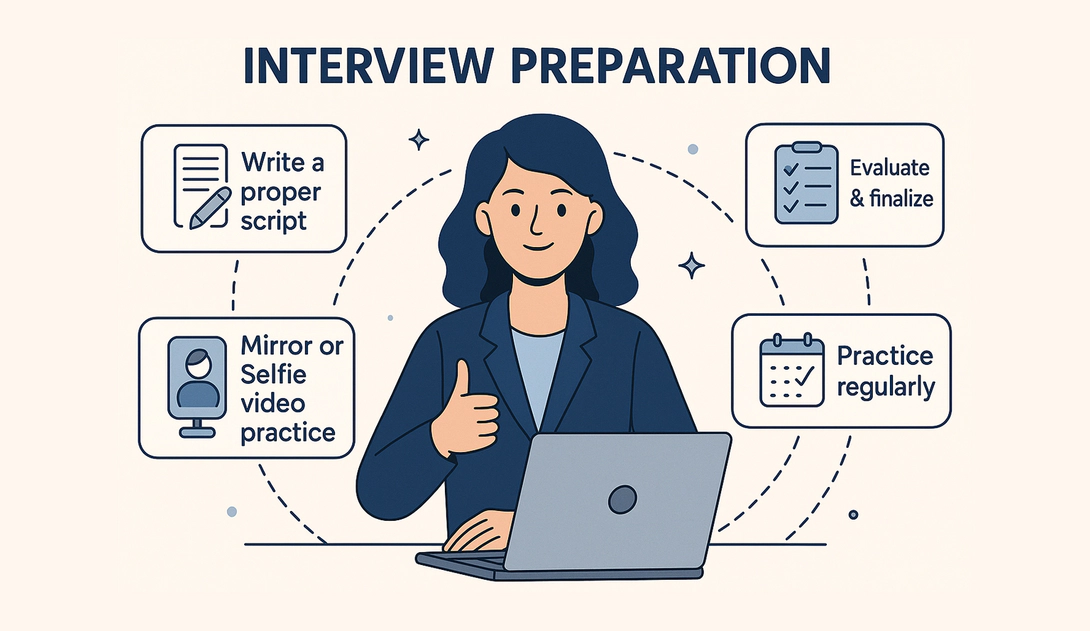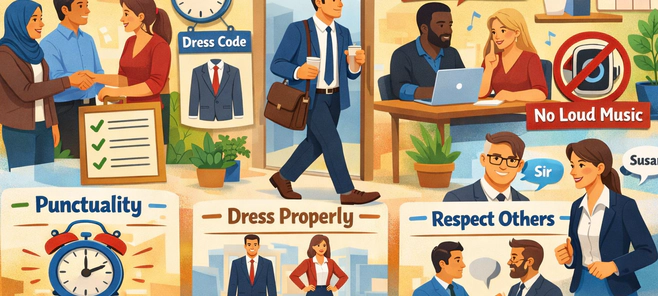An interview is a vital part of the recruitment process. Most of the candidates fear face-offs in interviews. But it is the easiest part if the candidate takes the proper interview preparation. There are some common interview questions on board; if a candidate takes proper preparation and provides a suitable answer, they can easily convince recruiters or HR. Here, we will discuss Interview preparation, including different types of interview models & interview questions & answer patterns.
1. Expectations from an interview
An interview is the best option to examine a candidate practically. Let’s think you buy a dress online, the design is very elegant, and you buy it at a lower price. After delivery, you became disappointed with the dress quality & design. Because there is a significant difference between the actual design color and quality and the online picture, the same thing can happen with a candidate. You can return & refund the dress, but organizations or HR cannot return or refund regarding the employee. If you choose a lower-quality employee, it can be a burden & long-term loss for the organization or company. That’s why organizations try to examine & select the best candidates. They expect candidates to prove their ability or confidence for the post. They match the person’s personality with the CV or resume. These expectations can be met by taking proper interview preparations.
2. Types of Interview
There are different types of interview patterns; for effective interview preparation, candidates or job seekers should be aware of these. Interview questions & answers depend on the interview pattern. Normally, interviews are conducted in person or online nowadays. Organization- or job-position-wise, these interview sessions have different expectations from candidates. Some positions or job types focus on technical knowledge, while others can be a person’s confidence, communication, thinking ability, etc. Let’s know some basic patterns or types of interviews that will help us with proper interview preparation.
2.1 Traditional interview
There are common interview patterns that we are familiar with. In a traditional format, an interview board typically conducts face-to-face interviews with candidates. Typically, this is an unstructured or semi-structured pattern in a questionnaire. This interview continues with the direction of the candidate’s answer. Different departments asked different questions, resulting in a mix of question types, including technical, situational, and behavioral. There are some common questions. If candidates or job seekers prepare based on these common questions & answers, they can easily outperform the board. Will discuss in detail regarding this.
2.2 Online/ Video Interview
Nowadays, this pattern is very popular in most countries. Some organizations have taken the initial interview via video. Many organizations encourage candidates to submit a video CV or a self-introduction video, which can be referred to as a video interview or a self-introduction interview. In this interview, the candidate must have taken all necessary technical preparations (Including an Internet connection & backup, proper framing, and required technology support, etc.).
2.3 Technical Interview
Some jobs or positions mainly require technical skills, for example, an MIS specialist, an IT specialist, a Software developer, a Machine operator, etc. In this interview, organizations mainly check the practical knowledge & problem-solving skills. Candidates can pre-survey the organization’s task types and find out common problems related to their field. Then, they can prepare. It is an interesting fact that many experienced persons know practical things; sometimes, interview boards ask theoretical questions regarding their job position. So, for better preparation, basic theoretical answers should be prepared.
2.4 Group Interview
Sometimes, organizations try to assess candidates by analyzing their communication, problem-solving ability, teamwork, and idea generation skills. One or two common topics or cases are given to the groups, and candidates discuss the topic, case, or issue. Normally, there is no specific answer or solution. Interviewers observe every single point about the candidates. They observe how candidates listen to others’ views, how they interpret & frame the best idea, how they react to others, etc. So if you are called for these types of interviews, you should be properly prepared for group communication etiquette, logical framing presentation techniques, etc.
2.5 Behavioral Interview
The interview board mainly conducts the interview traditional format, but they mainly focus on the behavioral issues of the candidate. For managerial positions or sensitive positions, organizations require a cool, positive attitude or a highly motivated employee. That’s why they create different types of scenarios or situations; there can be stressful situations, funny situations, heat-generating situations, twisting or awkward type questions. HR or Interviewer note candidates’ patience, ability to control the situation, anger issues, body language & facial expression. Proper listening, proper pause, slow answer, physical & mental control, these types of techniques can help the candidate to perform better.
3. Interview Preparation
We can develop a strategy regarding interview preparation. Mainly, we can divide the strategy into 2 phases:
- Knowledge gathering phase
- Strategy development regarding common interview questions
- Practice phase
3.1 Knowledge gathering phase
There are some common questions asked in an interview that are directly related to information, the easiest part that the candidate can present. A lot of candidates didn’t take it seriously, which is why they were rejected for this silly information.
3.1.1 Information about the organization
Basic information about the organization is often asked in the interview. For interview preparation, it is important to show your seriousness or interest in the organization. So collect basic information like:
- The company or organization’s Mission, vision, goal & values
- Types of business or their services
- Idea regarding their different wings
- Knowledge regarding their product & services
- Basic work culture
- Basic idea about the competitor
You can find it on their websites, social media platforms, or collect it from a reliable source. Note down the basic information and connect it to your mind.
3.1.2 Information about the position
A lot of candidates do not read the circular seriously, which is why in the interview board, they couldn’t satisfy the interviewer. The interviewer checks how serious and dedicated the candidate is regarding the job. That’s why job circulars, job descriptions, and responsibilities are very important. Note down some basic information:
- Context or background of the job post
- Main responsibility
- Regular tasks or duties
3.1.3 Basic informal information
Some informal information can help you to be more specific in an interview. Try to know about:
- Formal/informal culture
- Workstation environment
- Organogram
- Average salary structure
- Working hours
- Basic idea about their higher authority
4. Strategy development regarding Common interview questions
There are some fears about interviews - we don’t know what questions will be asked, or if we will be able to answer them. But interestingly, common questions are present in all types of interviews. If anyone takes proper preparation, they can perform far better in an interview. You can find sector-wise questions from reliable sources. You can even find the largest collection of IT interview questions and answers.
4.1 Prepare a set of questions for yourself
We often become tense about the questions, but nowadays, it’s easy to understand the pattern.
Let’s say you are the owner of a supershop and you’re interviewing a salesperson. Will you ask finance-related questions? Of course not - you’ll focus on sales.
Your main goal is to find out whether the candidate can sell your product. So you’ll ask things like:
- How can you convince a customer?
- What’s your sales strategy?
- How does your experience align with our store’s needs?
You might also test basic skills like:
- POS machine usage
- Basic counting
- Product knowledge
- Store management
So, when preparing for your own interview, put yourself in the interviewer’s shoes. You can also ask an AI application for possible questions based on your context.
Besides that, here are some common questions. Let’s discuss them.
4.2 Introduce yourself
This is the most common question, yet many people fail to answer it properly. They either say too little or talk too much. But the goal is simple: the recruiter wants to know about your background, personality, and how it connects to the role.
You can break your answer into 3 parts:
4.2.1 Basic Identity
Mention your name, current organization, and designation.
If you are a fresher, say your last degree or where you are from.
Avoid irrelevant details like your parents’ names or school.
4.2.2 Experience & Skills set
Briefly describe your core responsibility and relevant past tasks.
Only mention what adds value to the job you’re applying for.
Freshers can describe extracurricular or personal skills.
4.2.3 Why are you here & future goal
Explain how your skills can add value to this position and how the job fits into your long-term career goals.
Write a detailed script first, then make it concise. Use strong words, clear skills, and relevant examples.
4.3 Why will we hire you?
This question reveals how much you understand the position.
- Highlight the key responsibilities from the job ad
- Match them with your experience
- Mention quantitative results you’ve achieved
4.4 Why do you think you are fit for this position?
This is similar to the previous question, but focuses more on confidence.
Be specific - explain how you meet their expectations and will help them achieve their goals. Use job-related examples.
4.5 How can you add value with your experience?
Align your past tasks, responsibilities, and industry with this role.
Don’t just list duties - mention real outcomes and measurable achievements.
4.6 Why are you leaving your current organization?
A critical question for experienced candidates.
Never speak negatively about your current job.
Instead, focus on goals:
- New challenges
- Growth
- Learning opportunities
4.7 Tell me about your 3 strength areas
Highlight strengths that are directly relevant to the role.
Explain how these strengths will help the company or team.
4.8 Tell me about your improvement areas or weaknesses
Never mention a weakness that contradicts the job’s core responsibilities.
You can mention:
- A new skill you’re learning
- An area you’re already working on improving
This shows self-awareness and a growth mindset.
4.9 You are a fresher - why should we hire you?
Don’t panic. Everyone starts somewhere.
Mention any experiences that show:
- Responsibility
- Communication
- Management or planning
- Volunteer work
- Academic discipline
Show how those skills transfer to the job.
4.10 How do you handle stress or pressure situations?
Prepare 1-2 practical strategies you actually use.
This could include time management, deep breathing, prioritization, etc.
4.11 What do you know about our company?
Use your research to show seriousness:
- Highlight mission, values, services
- Mention recent projects or achievements
4.12 Do you have any questions for us?
Never skip this.
It’s a great way to show interest. Ask about:
- Team structure
- Growth opportunities
- KPIs or expectations for the role
5. Practice phase
Most of the time, candidates know some common questions and think they can easily answer them. But when they face the interview board, they fail - simply because they didn’t practice. A little bit of effort can make your interview much easier.
5.1 Write a proper script
You already know the common questions and the strategy behind good answers. Now write your script.
- Use proper wording
- Highlight relevant skills, experience, results, and outcomes
- Use AI tools to help build and refine answers
- Start with a long version and improve it gradually
5.2 Mirror or Selfie video practice
Practice by sitting formally in front of a mirror or camera. Record yourself while answering.
This helps:
- Build fluency
- Improve tone, posture, and expression
- Boost self-confidence
5.3 Evaluate & finalize
Watch your recordings and analyze:
- Do you look confident?
- Is your delivery convincing?
- Are your answers concise and relevant?
Based on your evaluation, revise your script and delivery style.
5.4 Practice regularly
You never know when the best opportunity will arrive. So:
- Practice daily
- Watch informative videos
- Stay updated in your field
Remember: it doesn’t matter if a war breaks out or not - an army always trains.
Job interviews are a battlefield. Your preparation is your weapon.
The more you practice, the sharper it becomes. Let’s start!





